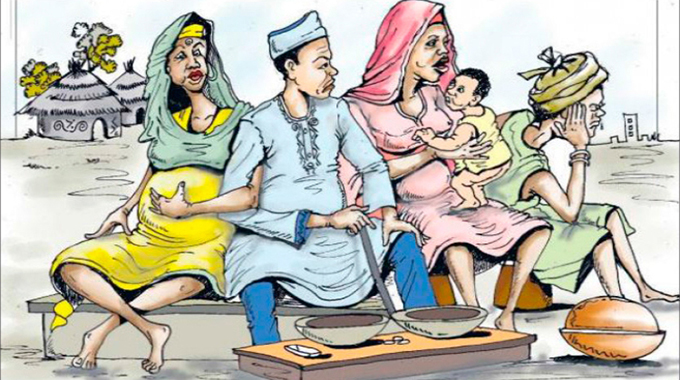Don’t they say women are a clever lot . . .

Unbeknown to him, his wives had connived to take contraceptives and each had a place in her garden where the community health worker went and dropped the pills. It was normally under a stone by the corner pole of the garden. The women had gotten tired of working for the children. Madzibaba Joha never worked except in the bedroom. Each wife was supposed to fend for her family. The deal was systematic, the wives took contraceptives at sunset every day, hence they would go to the garden every sunset without fail
Back in the village in the proverbial land of milk, honey and dust, or Guruve, good fortune has its own consequences: if you have five wives you have five tongues and five brains to deal with.
In as much as you have a buffet of love, at times it morphs into a cocktail of problems.
During the last Christmas holiday, this villager, the son of a peasant, visited a cousin, a member of the Johanne Marange Apostolic sect and hey, he has quite a job satisfying the needs of his five wives, I mean in virtually everything.
Madzibaba Joha, as he is affectionately known in the village, has at the age of 40 fathered 34 children with his five wives and, according to him, the sky is the limit.
God willing, he could father more children with the same women or God willing, he could still marry more wives from the church.
Madzibaba Joha is worried that in the past year or so, none of his wives has fallen pregnant, yet according to church doctrine, none of them uses contraceptives.
He has tried prayer after prayer, but the women keep on telling him to try harder.
Pray harder.
Try harder.
Harder, harder, harder and harder! Harder! Harder in bed! He has changed antics and styles, but to no avail.
In such occasions, even the best cooking pot does not produce food, do they not say that in the village?
But you see, in the village poverty understands and complies with the game of numbers.
Poverty is a good mathematician, when it counts more stomachs, it reduces the earnings and then, you become synonymous with a dearth of supplies.
Dear reader, this villager will go back to the reason why Madzibaba Joha is now “firing blanks”, yet church doctrine says reproduce and be as many as the grains of sand.
Madzibaba Joha’s homestead is built a spitting distance from Dande River. A footpath leads to the river.
Here Dande River flows gently, over gleaming stones polished smooth over the ages by running water.
Dande never dries up on this stretch and thickets of trees on the banks accompany water further down until it empties its contents into a silty sand swamp at its confluence with Manyame River, near Mushumbi Pools.
The river gives life to the whole village.
An intricate network of footpaths from various homesteads converges on the riverbanks like arms of an octopus.
Like a Catholic father confessor, Dande River has listened to many quarrels, between washing and bathing women, good and bad gossip, news and scandals.
It has witnessed budding romances become marriages and weddings.
It has seen many things, but remained mum.
It keeps secrets. The vegetable gardens on its banks are another source of life. They have their own stories too. Dande never tells those stories.
Madzibaba Joha’s homestead is a village on its own.
It consists of a large grass-thatched main house, around which are several such similar huts.
On the kitchens, the grass used for thatching is now dark brown with age, the weather and soot from the fires lit inside, for cooking, light and warmth.
The huts have characteristically low-hanging roofs with eaves that almost obscure the doorways.
The walls are decorated with chalk and each written scornful messages, typical of a polygamous set up.
The names of his children also tell stories.
Real life stories from affection, conquest up to disgruntlement.
The smaller huts tend to recede towards the edge of the perimeter fence, giving each wife and his children space, the much-needed space.
Madzibaba Joha and this villager sat by the shed, talking family matters and men’s issues and were soon joined by a boy who had just tethered their goats and penned up their cattle.
One after the other the wives brought food and the more than 10 boys sat around and set upon each plate as it came. This villager noted with amusement that the boys fell for each plate of food like maggots and made the food disappear as soon as it arrived.
It was akin to moths being attracted by light.
Madzibaba Joha and this villager proceeded to eat slowly and carefully, making sure we ate from each plate, throwing some of the food into the children’s plate and feeding the dogs at the same time — to make sure each wife’s plate went back to the kitchen empty. It is the badly cooked or the tasteless that was given to the boys and a neighbour’s dogs.
It is the one without meat as relish that was relegated to the boys and the dogs.
Madzibaba Joha knew each of his wives and how they cooked!
At times, he never allowed the food from the bad cookers to be tasted by this villager.
“This one is certainly for the dogs. You won’t like it. She just cannot cook. She is like that every day. She boils and boils and never goes further to fry or spice like others.
“This woman!’’ he mumbled to make sure it was inaudible to the children around. One good thing about Madzibaba Joha, this villager noticed, each wife would think her food was eaten.
It has kept the huge family at great peace. Madzibaba Joha spoke of the tactic of keeping family unity and how he has managed to do that.
Sure, his big family is peaceful when compared to even some monogamous marriages. Wisdom has been a part of him, but when it comes to his wives not conceiving anymore, that seems to have eluded him.
We later retired for the night, without incident. The wife on duty came to pick him up for a bath, disturbing our deep talk about him no longer impregnating his wives.
The following day, at about mid-morning as the sun rose imperceptibly from the east, one by one his wives disappeared to the river.
There they would water their gardens, but there was something special there.
On the particular day, a woman, a village health worker, rode past on her bicycle and waved her hand, but never stopped.
“You see that woman, she provides contraceptive for free to women in the village but does not stop by my home because we are members of the church and my wives do not take contraception. Actually, my wives do not even talk to her because they know she is evil. It is evil to take contraceptives.
“It is killing, actually it is murder,’’ he narrated.
Unbeknown to him, his wives had connived to take contraceptives and each had a place in her garden where the community health worker went and dropped the pills.
It was normally under a stone by the corner pole of the garden.
The women had gotten tired of working for the children.
Madzibaba Joha never worked except in the bedroom. Each wife was supposed to fend for her family. The deal was systematic, the wives took contraceptives at sunset every day, hence they would go to the garden every sunset without fail.
Meanwhile, Madzibaba Joha laboured in bed, expecting to drop one or two more children.
No one told him.
He suffered and neither did the church prophets get the trick.
The village soothsayer, the ageless autochthon of knowledge and wisdom says “the day money is destined to die, it finds all trees slippery.
“Where zebras huddle together, the lion lies down hungry.’’
Women are a clever lot.
The village never ceases to amaze me.
Each visit has its interesting story to tell. The Dander River remains quiet.
It shall not speak.










Comments